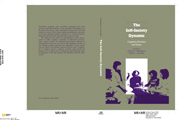Book contents
- Frontmatter
- Contents
- Contributors
- Preface and acknowledgments
- Introduction: The self–society dynamic
- 1 Exploring the relevance of social cognition for the relationship of self and society: Linking the cognitive perspective and identity theory
- 2 Toward a sociology of cognition
- 3 The cerebral self: Thinking and planning about identity-relevant activity
- 4 Growing up: The development and acquisition of social knowledge
- 5 The social contexts of self-feeling
- 6 Self-processes and emotional experiences
- 7 An affect control view of cognition and emotion
- 8 The self-concept as a basis for a theory of motivation
- 9 Attitudes, behavior, and the self
- 10 From changing selves toward changing society
- 11 Possible selves and social support: Social cognitive resources for coping and striving
- 12 Is the road to helping paved with good intentions? Or inertia?
- 13 Social structure and the moral self
- 14 The production of selves in personal relationships
- 15 Conclusion
- Indexes
15 - Conclusion
Published online by Cambridge University Press: 23 September 2009
- Frontmatter
- Contents
- Contributors
- Preface and acknowledgments
- Introduction: The self–society dynamic
- 1 Exploring the relevance of social cognition for the relationship of self and society: Linking the cognitive perspective and identity theory
- 2 Toward a sociology of cognition
- 3 The cerebral self: Thinking and planning about identity-relevant activity
- 4 Growing up: The development and acquisition of social knowledge
- 5 The social contexts of self-feeling
- 6 Self-processes and emotional experiences
- 7 An affect control view of cognition and emotion
- 8 The self-concept as a basis for a theory of motivation
- 9 Attitudes, behavior, and the self
- 10 From changing selves toward changing society
- 11 Possible selves and social support: Social cognitive resources for coping and striving
- 12 Is the road to helping paved with good intentions? Or inertia?
- 13 Social structure and the moral self
- 14 The production of selves in personal relationships
- 15 Conclusion
- Indexes
Summary
In this final chapter we will undertake an analysis of some general theoretical issues that are largely implicit in the preceding chapters. In particular, we would like to focus on the common sociological frame of reference of this volume. In our introductory chapter we highlighted the importance of cognition, emotion, and action in our understanding of the self-society link. Here we will take a more macro approach and turn to the common themes reflected in the various conceptualizations of society.
For the most part, the contributors to this volume are representative of a body of American social psychologists whose theoretical roots can be traced to the early American pragmatists. Indeed, the influence of James, Peirce, Cooley, and especially Mead is evident in many of the preceding chapters. This early pragmatic tradition can be said to have been the source of a number of distinct theoretical perspectives in both psychology and sociology, with psychology drawing more heavily from James, and sociology from Mead (cf. Lewis & Smith, 1980). Although there is no doubt a gulf between the psychological and sociological traditions on a number of theoretical issues, the self has served over the years as a conceptual bridge linking the two social psychologies. A particularly good example of this common conceptual focus can be found in the chapters by Stryker (chapter 1), Gecas (chapter 8), and Rosenberg (chapter 6) where the traditional psychological concerns of cognition, motivation, and emotion are explicitly developed from a sociological perspective.
- Type
- Chapter
- Information
- The Self-Society DynamicCognition, Emotion and Action, pp. 323 - 331Publisher: Cambridge University PressPrint publication year: 1991



